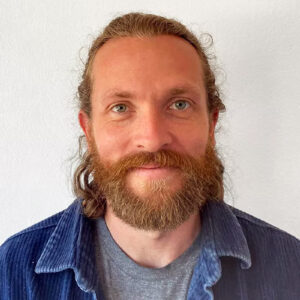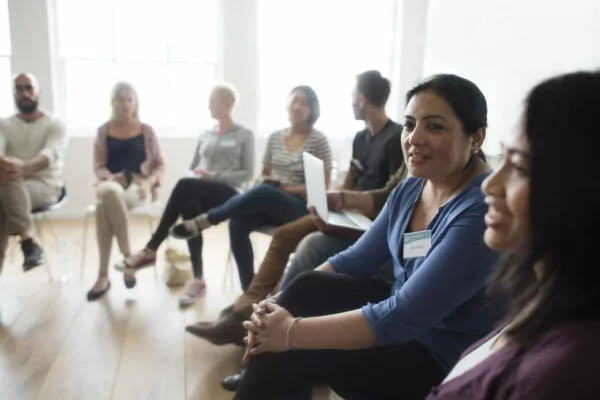Trainee therapist Tony Clark talks to us about male vulnerability and accessing therapy.
Tony Clark is a trainee integrative psychotherapist working within the low-cost counselling service at The Awareness Centre. After a career in the creative arts, Tony decided to train as a therapist. We talked to him about what led him to that decision, emotional barriers, anger, fear and strength in vulnerability.
I wanted to be part of the change

I think what this profession really values, above all else, is listening. And growing up as a man, it didn’t feel like listening or being listened to was a particularly important part of growing up.
When I was growing up, there were so many messages from society, like being told to “man up”, which I found quite confusing and limiting, and what I saw in therapy was an opportunity to change that.
Truly listening and being listened to can bring real vulnerability. And the impact of really being vulnerable, and really sharing how you feel, is good on an individual and societal level. For example, in the West, men are three to four times more likely to die by suicide than females so, statistically, the risk of not sharing how you feel is high.
So, I wanted to be part of something that might go about shifting that.
I’m learning that there’s strength in vulnerability.
I think the split [of male to female students] on my course has had a huge impact on me. There are three men on the course out of twenty students, and the impact of that is something that I’ve really been learning from.
One of the things that really stands out to me, in terms of the difference that this group has, is the view that there is strength in vulnerability. Essentially, at times, therapy training can feel like group therapy. We start the day off saying how we’re feeling and I used to just say what I thought people wanted to hear, or I would think about how I wanted to be perceived. However, what I’ve been learning throughout my training is that this group actually wants to hear how I am and hear what’s going on for me. I’m learning to step into that place of vulnerability. Being that vulnerable took quite a lot of strength. It felt quite scary to say how I really felt.
So, I’ve really been learning that there’s strength in vulnerability.
Part of it feels like it’s because it’s therapy [that people actually want to know how you feel]. But I also think that a big part of it is because the course is predominantly female. You know, there are more females in therapy, there are more female therapists, and maybe that’s because it’s more accepted for females to share how they feel. So, I’ve been learning to share my own feelings too.
Are you talking to somebody?
Although I still have more female clients, I find I’m working with quite a few longer-term clients who are men in their 20s. It touches on something slightly more personal for me
When it comes to working with young men. It always feels like quite a different experience to outside of therapy. I get to experience a man who is being quite vulnerable, and quite emotional. It always feels like a real privilege.
I do work with older male clients as well, and I find that there’s definitely more barriers to break down. There are so many more ideas that society has put upon them that means maybe they might be there [in therapy] but it’s a lot more of a struggle. Then I see these young men in their early 20s, and I’m really taken aback by how vulnerable they can be. It is really showing quite a good shift in society; that it is more acceptable to cry. You know, “boys don’t cry” is not such a strong thing anymore. That’s coming across in all parts of society and culture as well, I think.
When I was watching the Beckham documentary [on Netflix] the other night, Rio Ferdinand was talking about the struggles of young men, and that fifteen or twenty years ago, none of these guys would talk about how they were feeling. He said now, when you might know someone has something going on for them, the first thing you might say to that person is “are you talking to someone?”. And that’s a real shift. I guess football culture is representative of a part of society that has been much more along the lines of “man up” and “pull your socks up”, so it’s really nice to see that change.
The paralysing impact on men
In my experience, the issues that male and female clients bring to therapy are actually very similar. However, what I’ve been working with a lot lately is people coming in with lots of ideas of what they think they should do or who they think they should be. And, in the case of men, it’s about being told to be brave. The impact of this might be feeling depressed or anxious or just weighed down by something, and so much of the problem is trying to live in a way that they think they should.
For a long time, women have been told not to be angry and, one of the negative things about society changing, is that men are also now being told not to be angry. Whilst anger can be a difficult thing to deal with, it has the potential to be useful in therapy. We can access that anger and explore what’s really going on for the person, and what’s behind it. Nowadays, a lot of men are being told not to be angry and not to cry. So men can end up feeling quite paralysed and wondering “What can I be?” and “What is acceptable?” in our society.
Being vulnerable is brave
I think if being vulnerable was seen differently – was seen as being brave and as what it is to become a man – then any potential stigma that therapy has of being weak, of being a luxury, will be reduced.
On a personal level, when I tell someone that I’m going to therapy later that day, for example, there’s still a small side of me that thinks “shall I just roll my sleeves up, pull my socks up, you know, get on with it?”
And, I think, the more that shifts, and the more that it’s seen that being vulnerable is actually very brave, then I think that more people will go to therapy.
It’s not that something’s necessarily wrong, and it’s not that it’s weak – therapy can be just a part of normal life.
We need to look at the impact on men…
I wish men would say more what they are actually afraid of. There are so many consequences of not really sharing what you’re afraid of. For the individual the consequences of bottling something up can be that it eats away at them. It becomes a limiting factor. For example, when I was asked to do this interview, I was afraid that I wouldn’t do it justice. I thought that maybe I just shouldn’t do it. However, I realised that declining this opportunity would just be making my life smaller.
On a societal level, I think fear can make men turn to conflict quite quickly. I guess what I’m thinking about here is the correction in society at the moment around gender inequalities. There is an attempt to prioritise women because of how they’ve been neglected in society for such a long time, which is obviously very important. But, we should also look at the impact that this is having on men. Often men are drawing these battle lines and creating an ‘us against them’ mentality, which is coming about because of men’s fear. If men’s fear is expressed, shared, and talked about then I don’t think we’d have these kinds of separate camps.
If you would like support with any of the issues Tony has discussed please contact the reception team on 020 8038 4624 or email [email protected] and they can help you find the right therapist for you. If you are interested in training as a therapist, please visit our Training School for further information.








